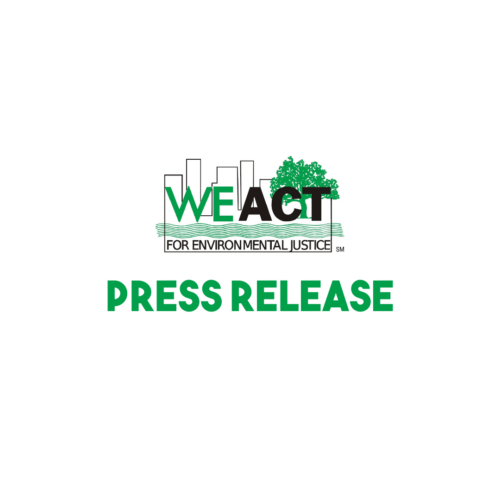WE ACT for Environmental Justice Responds to the New York City Department of Buildings Proposed Rules for Local Law 97
FOR IMMEDIATE RELEASE
October 21, 2022
Contact: Chris Dobens, chris@weact.org, 718-679-8542
NEW YORK – In response to the New York City Department of Buildings release of the proposed rules for New York City Local Law 97, Lonnie Portis, WE ACT for Environmental Justice’s Environmental Policy and Advocacy Coordinator, issued the following statement:
“The passage of the landmark Climate Mobilization Act in 2019 was a significant step in reducing New York City’s building pollution. Buildings contribute to over 70 percent of the city’s greenhouse gas pollution, which causes climate change. They are also a source of pollution which causes health issues such as respiratory and cardiovascular illness. Both climate change and air pollution disproportionately harm communities of color.
Local Law 97 of 2019 requires building owners to meet pollution reduction targets by optimizing building energy systems to make them more efficient. This year we have been fighting to ensure that the Adams administration makes significant progress in equitably implementing Local Law 97, as written, to reduce the city’s contribution to the climate crisis, improve the health of our communities, and create thousands of good green jobs here in New York City. WE ACT commends the Adams administration for proposing these rules, which are an important step towards implementing this law. However, we are wary of real estate loopholes included in the proposed rules that will weaken critical enforcement mechanisms written into the law and undermine potential benefits to low-income communities and communities of color. It is vital that the Adams administration implement strong rules for Local Law 97 that directly reduce building pollution across the city.
Without Local Law 97, our buildings will continue to be the leading local driver of the climate crisis, while poisoning the health of our children, families, and communities at large. Even more so, environmental justice communities will continue to face the brunt of this burden and will be forced to sacrifice our health to subsidize the wealth of the real estate and fossil fuel industries. Over 1,000 New York City residents are killed each year by pollution from fossil fuel use in our buildings, and these harms are not felt equally across the city. Communities of color are exposed to 17 percent more air pollution, and Black communities are hit the hardest, breathing in 32 percent more particulate matter than their counterparts.
The New York City Department of Buildings is proposing to add a new rule, 103-14, to implement Section 28-320 Chapter 3 or Title 28 of the New York City Administrative Code by establishing the procedures for reporting on complying with annual greenhouse gas (GHG) emissions limits for buildings. It is important that the Adams administration address the two critical issues below in order to achieve the strongest version of the law. We thank the administration for their commitment to addressing climate change and look forward to working together to address building pollution.
Some of the specific concerns we have with the proposed rules include:
Definition of ‘Good Faith Efforts’ – the lack of definition in regards to ‘good faith efforts’ leaves enforcement open to potential exploitation by the real estate industry. The proposed rules make it clear that ‘compliance is critical’ to feel the collective benefits of the law. However, guidelines that are enforced on a case-by-case basis undermine enforcement. We must have a high standard for the implementation of the law.
Renewable Energy Credits (RECs) – We urge the Department of Buildings to prevent the over-reliance on RECs to offset utility supplied electricity. The rule as currently written risks jeopardizing Local Law 97’s ability to lower fossil-fueled electricity consumption. If there is no limit imposed on the use of RECs, there will be no need for landlords to reduce building pollution directly, thereby eliminating the prospect of improving indoor health for residents and neutralizing the need for thousands of living-wage green jobs that would be essential to transitioning our buildings to more sustainable and efficient energy use.
We are in the midst of a worsening climate crisis and the City must do everything it can to reduce emissions, decarbonize our buildings, and remediate environmental health hazards – all with environmental and climate justice as the foundation of this work. The Adams administration has the opportunity to showcase New York City as a leader in equitably tackling the climate crisis by implementing strong rules for Local Law 97.”
# # #
WE ACT for Environmental Justice is a Northern Manhattan membership-based organization whose mission is to build healthy communities by ensuring that people of color and/or low-income residents participate meaningfully in the creation of sound and fair environmental health and protection policies and practices. WE ACT has offices in New York and Washington, D.C. Visit us at weact.org and follow us on Facebook, Twitter, and Instagram.
